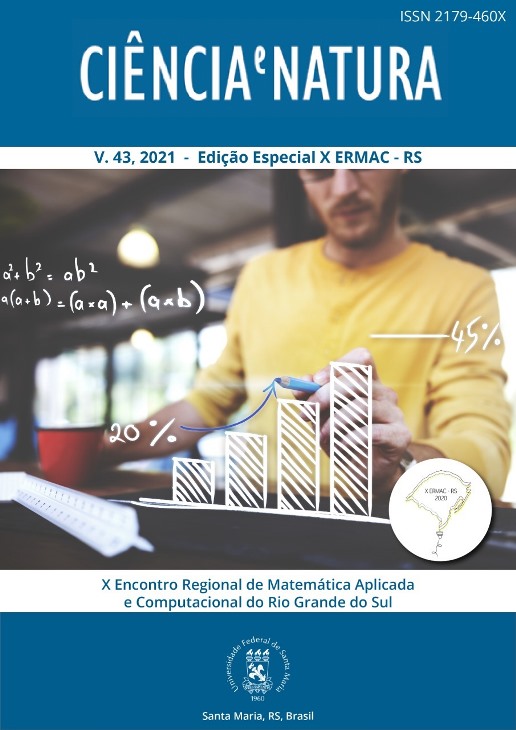Impacto do distanciamento social em um modelo discreto para COVID-19
DOI:
https://doi.org/10.5902/2179460X66996Palavras-chave:
COVID-19, Modelos Discretos, SEIR, Distanciamento SocialResumo
O objetivo deste trabalho é apresentar um modelo SEIR discreto para analisar os efeitos qualitativos do distanciamento social na dinâmica da epidemia de COVID-19. Nossos resultados indicam que a eficiência desta medida não farmacêutica depende de sua duração e da adesão da população.Downloads
Referências
BRAUER, F., FENG, Z., CASTILLO-CHAVEZ, C. Discrete epidemic models. Math Biosci Eng, 7(1), 1–15, 2010.
BRITTON, N. F. Essential Mathematical Biology, Springer-Verlag, London, 2003.
BUCKEE, C.O. et al. Aggregated mobility data could help fight COVID-19. Science, 10, 368(6487), 145-146, 2020. doi: 10.1126/science.abb8021. Epub 2020 Mar 23. PMID: 32205458.Ciência e Natura 6
FERGUSON, N. M. et al. Impact of non-pharmaceutical interventions (NPIs) to reduce COVID-19 mortality and healthcare demand. Imperial College Report, 2020. DOI: https://doi.org/10.25561/77482.
KERMACK, W. and MCKENDRICK, A. A contribution to the mathematical theory of epidemics. Proceedings of the Royal Society of London Series A, 115, 700-721, 1927.
NEVES, A. G. M. Quarentena para o COVID-19: início, intensidade e término. Preprint, 2020.
PREM, K. et al. The effect of control strategies to reduce social mixing on outcomes of the COVID-19 epidemic in Wuhan, China: a modelling study. Lancet Public Health., 2020. doi.org/10.1016/S2468-2667(20)30073-6.
Publicado
Como Citar
Edição
Seção
Licença
Copyright (c) 2021 Ciência e Natura

Este trabalho está licenciado sob uma licença Creative Commons Attribution-NonCommercial-ShareAlike 4.0 International License.
Para acessar a DECLARAÇÃO DE ORIGINALIDADE E EXCLUSIVIDADE E CESSÃO DE DIREITOS AUTORAIS clique aqui.
Diretrizes Éticas para Publicação de Revistas
A revista Ciência e Natura está empenhada em garantir a ética na publicação e na qualidade dos artigos.
A conformidade com padrões de comportamento ético é, portanto, esperada de todas as partes envolvidas: Autores, Editores e Revisores.
Em particular,
Autores: Os Autores devem apresentar uma discussão objetiva sobre a importância do trabalho de pesquisa, bem como detalhes e referências suficientes para permitir que outros reproduzam as experiências. Declarações fraudulentas ou intencionalmente incorretas constituem comportamento antiético e são inaceitáveis. Artigos de Revisão também devem ser objetivos, abrangentes e relatos precisos do estado da arte. Os Autores devem assegurar que seu trabalho é uma obra totalmente original, e se o trabalho e / ou palavras de outros têm sido utilizadas, isso tem sido devidamente reconhecido. O plágio em todas as suas formas constitui um comportamento publicitário não ético e é inaceitável. Submeter o mesmo manuscrito a mais de um jornal simultaneamente constitui um comportamento publicitário não ético e é inaceitável. Os Autores não devem submeter artigos que descrevam essencialmente a mesma pesquisa a mais de uma revista. O Autor correspondente deve garantir que haja um consenso total de todos os Co-autores na aprovação da versão final do artigo e sua submissão para publicação.
Editores: Os Editores devem avaliar manuscritos exclusivamente com base no seu mérito acadêmico. Um Editor não deve usar informações não publicadas na própria pesquisa do Editor sem o consentimento expresso por escrito do Autor. Os Editores devem tomar medidas de resposta razoável quando tiverem sido apresentadas queixas éticas relativas a um manuscrito submetido ou publicado.
Revisores: Todos os manuscritos recebidos para revisão devem ser tratados como documentos confidenciais. As informações ou ideias privilegiadas obtidas através da análise por pares devem ser mantidas confidenciais e não utilizadas para vantagens pessoais. As revisões devem ser conduzidas objetivamente e as observações devem ser formuladas claramente com argumentos de apoio, de modo que os Autores possam usá-los para melhorar o artigo. Qualquer Revisor selecionado que se sinta desqualificado para rever a pesquisa relatada em um manuscrito ou sabe que sua rápida revisão será impossível deve notificar o Editor e desculpar-se do processo de revisão. Os Revisores não devem considerar manuscritos nos quais tenham conflitos de interesse resultantes de relacionamentos ou conexões competitivas, colaborativas ou outras conexões com qualquer dos autores, empresas ou instituições conectadas aos documentos.






